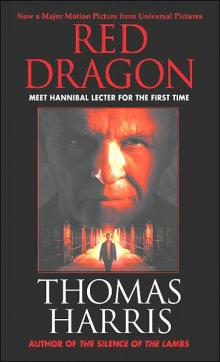- Home
- Thomas Harris
Hannibal Page 6
Hannibal Read online
Page 6
There is an abrupt shear in style at the new wing of the Verger mansion. The modern functional structure is reached through frosted glass double doors, incongruous in the vaulted hall.
Margot Verger paused outside the doors. She looked at Starling with her glittery, irritated gaze.
“Some people have trouble talking with Mason,” she said. “If it bothers you, or you can’t take it, I can fill you in later on whatever you forget to ask him.”
There is a common emotion we all recognize and have not yet named—the happy anticipation of being able to feel contempt. Starling saw it in Margot Verger’s face. All Starling said was “Thank you.”
To Starling’s surprise, the first room in the wing was a large and well-equipped playroom. Two African-American children played among oversized stuffed animals, one riding a Big Wheel and the other pushing a truck along the floor. A variety of tricycles and wagons were parked in the corners and in the center was a large jungle gym with the floor heavily padded beneath it.
In a corner of the playroom, a tall man in a nurse’s uniform sat on a love seat reading Vogue. A number of video cameras were mounted on the walls, some high, others at eye level. One camera high in the corner tracked Starling and Margot Verger, its lens rotating to focus.
Starling was past the point where the sight of a brown child pierced her, but she was keenly aware of these children. Their cheerful industry with the toys was pleasant to see as she and Margot Verger passed through the room.
“Mason likes to watch the kids,” Margot Verger said. “It scares them to see him, all but the littlest ones, so he does it this way. They ride ponies after. They’re day-care kids out of child welfare in Baltimore.”
Mason Verger’s chamber is approached only through his bathroom, a facility worthy of a spa that takes up the entire width of the wing. It is institutional-looking, all steel and chrome and industrial carpet, with wide-doored showers, stainless-steel tubs with lifting devices over them, coiled orange hoses, steam rooms and vast glass cabinets of unguents from the Farmacia di Santa Maria Novella in Florence. The air in the bathroom was still steamy from recent use and the scents of balsam and wintergreen hung in the air.
Starling could see light under the door to Mason Verger’s chamber. It went out as his sister touched the doorknob.
A seating area in the corner of Mason Verger’s chamberwas severely lit from above. A passable print of William Blake’s “The Ancient of Days” hung above the couch—God measuring with his calipers. The picture was draped with black to commemorate the recent passing of the Verger patriarch. The rest of the room was dark.
From the darkness came the sound of a machine working rhythmically, sighing at each stroke.
“Good afternoon, Agent Starling.” A resonant voice mechanically amplified, the fricative f lost out of afternoon.
“Good afternoon, Mr. Verger,” Starling said into the darkness, the overhead light hot on the top of her head. Afternoon was someplace else. Afternoon did not enter here.
“Have a seat.”
Going to have to do this. Now is good. Now is called for.
“Mr. Verger, the discussion we’ll have is in the nature of a deposition and I’ll need to tape-record it. Is that all right with you?”
“Sure.” The voice came between the sighs of the machine, the sibilant s lost from the word. “Margot, I think you can leave us now.”
Without a look at Starling, Margot Verger left in a whistle of riding pants.
“Mr. Verger, I’d like to attach this microphone to your—clothing or your pillow if you’re comfortable with that, or I’ll call a nurse to do it if you prefer.”
“By all means,” he said, minus the b and the m. He waited for power from the next mechanical exhalation. “You can do it yourself, Agent Starling. I’m right over here.”
There were no light switches Starling could find at once. She thought she might see better with the glare out of her eyes and she went into the darkness, one hand before her, toward the smell of wintergreen and balsam.
She was closer to the bed than she thought when he turned on the light.
Starling’s face did not change. Her hand holding the clip-on microphone jerked backward, perhaps an inch.
Her first thought was separate from the feelings in her chest and stomach; it was the observation that his speech anomalies resulted from his total lack of lips. Her second thought was the recognition that he was not blind. His single blue eye was looking at her through a sort of monocle with a tube attached that kept the eye damp, as it lacked a lid. For the rest, surgeons years ago had done what they could with expanded skin grafts over bone.
Mason Verger, noseless and lipless, with no soft tissue on his face, was all teeth, like a creature of the deep, deep ocean. Inured as we are to masks, the shock in seeing him is delayed. Shock comes with the recognition that this is a human face with a mind behind it. It churns you with its movement, the articulation of the jaw, the turning of the eye to see you. To see your normal face.
Mason Verger’s hair is handsome and, oddly, the hardest thing to look at. Black flecked with gray, it is plaited in a ponytail long enough to reach the floor if it is brought back over his pillow. Today his plaited hair is in a big coil on his chest above the turtle-shell respirator. Human hair beneath the blue-john ruin, the plaits shining like lapping scales.
Under the sheet, Mason Verger’s long-paralyzed body tapered away to nothing on the elevated hospital bed.
Before his face was the control that looked like panpipes or a harmonica in clear plastic. He curled his tongue tubelike around a pipe end and puffed with the next stroke of his respirator. His bed responded with a hum, turned him slightly to face Starling and increased the elevation of his head.
“I thank God for what happened,” Verger said. “It was my salvation. Have you accepted Jesus, Miss Starling? Do you have faith?”
“I was raised in a close religious atmosphere, Mr. Verger. I have whatever that leaves you with,” Starling said. “Now, if you don’t mind, I’m just going to clip this to the pillowcase. It won’t be in the way here, will it?” Her voice sounded too brisk and nursey to suit her.
Her hand beside his head, seeing their two fleshes together, did not aid Starling, nor did his pulse in the vessels grafted over the bones of his face to feed it blood; their regular dilation was like worms swallowing.
Gratefully, she paid out cord and backed to the table and her tape recorder and separate microphone.
“This is Special Agent Clarice M. Starling, FBI number 5143690, deposing Mason R. Verger, Social Security number 475989823, at his home on the date stamped above, sworn and attested. Mr. Verger understands that he has been granted immunity from prosecution by the U.S. Attorney for District Thirty-six, and by local authorities in a combined memorandum attached, sworn and attested.
“Now, Mr. Verger—”
“I want to tell you about camp,” he interrupted with his next exhalation. “It was a wonderful childhood experience that I’ve come back to, in essence.”
“We can get to that, Mr. Verger, but I thought we’d—”
“Oh, we can get to it now, Miss Starling. You see, it all comes to bear. It was how I met Jesus, and I’ll never tell you anything more important than that.” He paused for the machine to sigh. “It was a Christian camp my father paid for. He paid for the whole thing, all one hundred twenty-five campers on Lake Michigan. Some of them were unfortunates and they would do anything for a candy bar. Maybe I took advantage of it, maybe I was rough with them if they wouldn’t take the chocolate and do what I wanted—I’m not holding anything back, because it’s all okay now.”
“Mr. Verger, let’s look at some material with the same—”
He was not listening to her, he was only waiting for the machine to give him breath. “I have immunity, Miss Starling, and it’s all okay now. I’ve got a grant of immunity from Jesus, I’ve got immunity from the U.S. Attorney, I’ve got immunity from the DA in Owings Mills, Hallelujah.
I’m free, Miss Starling, and it’s all okay now. I’m right with Him and it’s all okay now. He’s the Risen Jesus, and at camp we called him The Riz. Nobody beats The Riz. We made it contemporary, you know, The Riz. I served Him in Africa, Hallelujah, I served Him in Chicago, praise His name, and I serve Him now and He will raise me up from this bed and He will smite mine enemies and drive them before me and I will hear the lamentations of their women, and it’s all okay now.” He choked on saliva and stopped, the vessels on the front of his head dark and pulsing.
Starling rose to get a nurse, but his voice stopped her before she reached the door.
“I’m fine, it’s all okay now.”
Maybe a direct question would be better than trying to lead him. “Mr. Verger, had you ever seen Dr. Lecter before the court assigned you to him for therapy? Did you know him socially?”
“No.”
“You were both on the board of the Baltimore Philharmonic.”
“No, my seat was just because we contribute. I sent my lawyer when there was a vote.”
“You never gave a statement in the course of Dr. Lecter’s trial.” She was learning to time her questions so he would have breath to answer.
“They said they had enough to convict him six times, nine times. And he beat it all on an insanity plea.”
“The court found him insane. Dr. Lecter did not plead.”
“Do you find that distinction important?” Mason asked.
With the question, she first felt his mind, prehensile and deep-sleeved, different from the vocabulary he used with her.
The big eel, now accustomed to the light, rose from the rocks in his aquarium and began the tireless circle, a rippling ribbon of brown beautifully patterned with irregular cream spots.
Starling was ever aware of it, moving in the corner of her vision.
“It’s a Muraena Kidako,” Mason said. “There’s an even bigger one in captivity in Tokyo. This one is second biggest.
“Its common name is the Brutal Moray, would you like to see why?”
“No,” Starling said, and turned a page in her notes. “So in the course of your court-ordered therapy, Mr. Verger, you invited Dr. Lecter to your home.”
“I’m not ashamed anymore. I’ll tell you about anything. It’s all okay now. I got a walk on those trumped-up molestation counts if I did five hundred hours of community service, worked at the dog pound and got therapy from Dr. Lecter. I thought if I got the doctor involved in something, he’d have to cut me some slack on the therapy and wouldn’t violate my parole if I didn’t show up all the time, or if I was a little stoned at my appointments.”
“This was when you had the house in Owings Mills.”
“Yes. I had told Dr. Lecter everything, about Africa and Idi and all, and I said I’d show him some of my stuff.”
“You’d show him …?”
“Paraphernalia. Toys. In the corner there, that’s the little portable guillotine I used for Idi Amin. You can throw it in the back of a Jeep, go anywhere, the most remote village. Set up in fifteen minutes. Takes the condemned about ten minutes to cock it with a windlass, little longer if it’s a woman or a kid. I’m not ashamed of any of that, because I’m cleansed.”
“Dr. Lecter came to your house.”
“Yes. I answered the door in some leather, you know. Watched for some reaction, didn’t see any. I was concerned he’d be afraid of me, but he didn’t seem to be. Afraid of me—that’s funny now. I invited him upstairs. I showed him, I had adopted some dogs from the shelter, two dogs that were friends, and I had them in a cage together with plenty of fresh water, but no food. I was curious about what would eventually happen.
“I showed him my noose setup, you know, autoerotic asphyxia, you sort of hang yourself but not really, feels good while you—you follow?”
“I follow.”
“Well, he didn’t seem to follow. He asked me how it worked and I said, you’re an odd psychiatrist not to know that, and he said, and I’ll never forget his smile, he said, ‘Show me.’ I thought, I’ve got you now!”
“And you showed him.”
“I am not ashamed of that. We grow by our mistakes. I’m cleansed.”
“Please go on, Mr. Verger.”
“So I pulled down the noose in front of my big mirror and put it on and had the release in my hand, and I was beating off with the other hand watching for his reaction, but I couldn’t tell anything. Usually I can read people. He was sitting in a chair over in the corner of the room. His legs were crossed and he had his fingers locked over his knee. Then he stood up and reached in his jacket pocket, all elegant, like James Mason reaching for his lighter, and he said, ‘Would you like an amyl popper?’ I thought, Wow!—he gives me one now and he’s got to give them to me forever to keep his license. Prescription city. Well, if you read the report, you know it was a lot more than amyl nitrite.”
“Angel Dust and some other methamphetamines and some acid,” Starling said.
“I mean whoa! He went over to the mirror I looked at myself in, and kicked the bottom of it and took out a shard. I was flying. He came over and gave me the piece of glass and looked me in the eyes and suggested I might like to peel off my face with it. He let the dogs out. I fed them my face. It took a long time to get it all off, they say. I don’t remember. Dr. Lecter broke my neck with the noose. They got my nose back when they pumped the dogs’ stomachs at the animal shelter, but the graft didn’t take.”
Starling took longer than she needed to in rearranging the papers on the table.
“Mr. Verger, your family posted the reward after Dr. Lecter escaped from custody in Memphis.”
“Yes, a million dollars. One million. We advertised worldwide.”
“And you also offered to pay for any kind of relevant information, not just the usual apprehension and conviction. You were supposed to share that information with us. Have you always done that?”
“Not exactly, but there was never anything good to share.”
“How do you know that? Did you follow up on some leads yourself?”
“Just far enough to know they were worthless. And why shouldn’t we—you people never told us anything. We had a tip from Crete that was nothing and one from Uruguay that we could never confirm. I want you to understand, this is not a revenge thing, Miss Starling. I have forgiven Dr. Lecter just as Our Savior forgave the Roman soldiers.”
“Mr. Verger, you indicated to my office that you might have something now.”
“Look in the drawer of the end table.”
Starling took the white cotton gloves out of her purse and put them on. In the drawer was a large manila envelope. It was stiff and heavy. She pulled out an X ray and held it to the bright overhead light. The X ray was of a left hand that appeared to be injured. She counted the fingers. Four plus the thumb.
“Look at the metacarpals, do you know what I’m talking about?”
“Yes.”
“Count the knuckles.”
Five knuckles. “Counting the thumb, this person had six fingers on his left hand. Like Dr. Lecter.”
“Like Dr. Lecter.”
The corner where the X ray’s case number and origin should be was clipped off.
“Where did it come from, Mr. Verger?”
“Rio de Janeiro. To find out more, I have to pay. A lot. Can you tell me if it’s Dr. Lecter? I need to know if I should pay.”
“I’ll try, Mr. Verger. We’ll do our best. Do you have the package the X ray came in?”
“Margot has it in a plastic bag, she’ll give it to you. If you don’t mind, Miss Starling, I’m rather tired and I need some attention.”
“You’ll hear from my office, Mr. Verger.”
Starling had not been out of the room long when Mason Verger tooted the endmost pipe and said, “Cordell?” The male nurse from the playroom came in and read to him from a folder marked DEPARTMENT OF CHILD WELFARE, CITY OF BALTIMORE.
“Franklin, is it? Send Franklin in,” Mason said, and turned out his light
.
The little boy stood alone under the bright overhead light of the seating area, squinting into the gasping darkness.
Came the resonant voice, “Are you Franklin?”
“Franklin,” the little boy said.
“Where do you stay, Franklin?”
“With Mama and Shirley and Stringbean.”
“Does Stringbean stay there all the time?”
“He in and out.”
“Did you say ‘He in and out’?”
“Yeah.”
“‘Mama’ is not your real mama, is she, Franklin?”
“She my foster.”
“She’s not the first foster you’ve had, is she?”
“Nome.”
“Do you like it at your house, Franklin?”
He brightened. “We got Kitty Cat. Mama make patty-cake in the stove.”
“How long have you been there, at Mama’s house?”
“I don’t know.”
“Have you had a birthday there?”
“One time I did. Shirley make Kool-Aid.”
“Do you like Kool-Aid?”
“Strawberry.”
“Do you love Mama and Shirley?”
“I love, um hum, and Kitty Cat.”
“Do you want to live there? Do you feel safe when you go to bed?”
“Um hum. I sleep in the room with Shirley. Shirley, she a big girl.”
“Franklin, you can’t live there anymore with Mama and Shirley and the Kitty Cat. You have to go away.”
“Who say?”
“The government say. Mama has lost her job and her approval as a foster home. The police found a marijuana cigarette in your house. You can’t see Mama anymore after this week. You can’t see Shirley anymore or Kitty Cat after this week.”
“No,” Franklin said.
“Or maybe they just don’t want you anymore, Franklin. Is there something wrong with you? Do you have a sore on you or something nasty? Do you think your skin is too dark for them to love you?”
Franklin pulled up his shirt and looked at his small brown stomach. He shook his head. He was crying.
“Do you know what will happen to Kitty Cat? What is Kitty Cat’s name?”
“She call Kitty Cat, that her name.”

 The Silence of the Lambs
The Silence of the Lambs Red Dragon
Red Dragon Hannibal
Hannibal Black Sunday
Black Sunday Cari Mora
Cari Mora Hannibal Rising
Hannibal Rising Red Dragon hl-1
Red Dragon hl-1 The Silence of the Lambs (Hannibal Lecter)
The Silence of the Lambs (Hannibal Lecter)